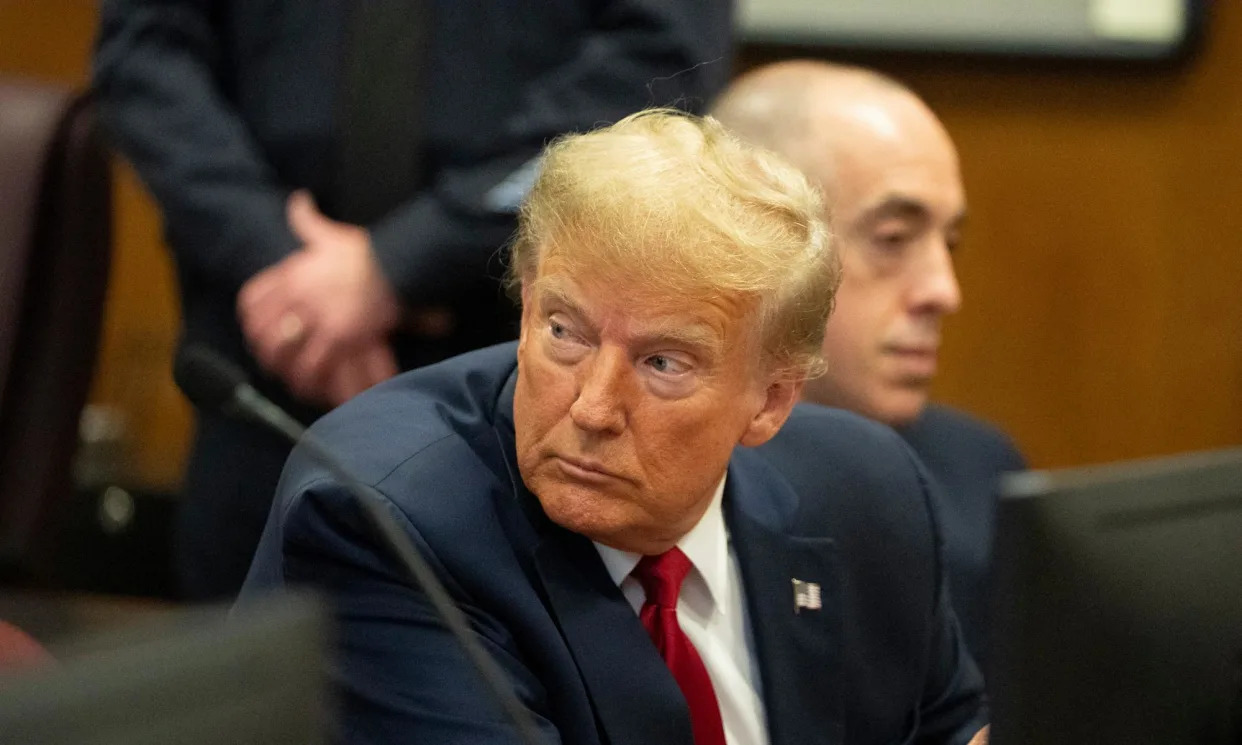
Donald Trump was already reeling from multiple legal setbacks when a New York judge last week handed the former president a staggering defeat in his civil fraud case, ordering him to pay roughly $450m to the state after finding him liable for conspiracy to manipulate his net worth.
The decision by Justice Arthur Engoron capped a bad legal week for Trump, who had watched his lawyers attempt to get access to sealed filings in a classified documents case in Florida and then watched his lawyers lose their attempt to delay his first criminal trial in New York.
There may be worse coming.
Trump saw the ruling as a two-pronged stab at his personal identity: it is likely to almost entirely drain his accounts of cash and it bars him from running the Trump Organization, the vehicle he used to attain his fame, for three years.
Trump’s preference is to avoid using his own money while he appeals and his lawyers have contacted several companies to provide the bond, which essentially assures the state that Trump has the money to pay the judgment should he lose his challenge.
To obtain the bond, Trump would first have to find a company willing to accept him. He would then have to pay a premium to the bond company and offer collateral, probably in the form of his most prized assets, which would accrue interest and fees.
If the penalty is upheld on appeal, Trump will face a huge financial burden. In an interview under oath with the New York attorney general’s office last year, Trump said he had $400m in cash and cash equivalents, though that figure could not be verified.
A proportion of that figure comes from Trump’s sales of two properties after he left the White House, as well as new ventures including a real estate branding deal in Oman.
The deals were intended to give Trump a cash cushion in the event of a sudden financial setback. But even if Trump’s $400m claim was accurate, that would clearly be wiped out should the $450m penalty be largely upheld.
Adding to the total sum Trump must disgorge is an $83.3m judgment entered against him last month after he lost the second defamation trial involving the writer E Jean Carroll. That figure is not payable immediately, but it is another huge amount for which he has to account.
Trump may ultimately find himself without enough of a cushion and face the need to mortgage or sell some of his properties. While Trump is not expected to go bankrupt – his total holdings are in the billions – it would mark a particularly humiliating moment for the former president.
The legal woes extend beyond causing him financial pain. On Thursday, it was confirmed Trump would face trial in New York on charges that he falsified business records over hush-money payments to a porn star to shield himself from bad press before the 2016 election.
Jury selection in the case is now scheduled for 25 March, despite a last-ditch attempt by Trump’s lawyers to stave off the trial.
Before the hearing to affirm the trial date, people involved in the situation said, Trump’s advisers had retained some hope it might be delayed even if they believed it was the most politically advantageous case of all his four criminal indictments.
If Trump must face a criminal case before the election in November, they would choose the hush-money case because Trump may not face jail time even if he is convicted, an outcome that could desensitize voters to the other, federal criminal cases looming before him.
But Trump may have to grapple with the fallout from another legal setback in Atlanta, after he and his co-defendants charged by the Fulton county district attorney over his efforts to overturn the 2020 election struggled to argue she should be disqualified from bringing the case.
The second day of the evidentiary hearing examining whether Fani Willis’s romantic relationship with her top deputy, Nathan Wade, amounted to some sort of kickback scheme sufficient to generate a conflict of interest went sideways for the defendants.
The defendants called Terrence Bradley, the former divorce lawyer for Wade, to testify that the relationship started before Willis hired Wade to work on the Trump case on 1 November 2021, in order to contradict Willis and Wade’s testimony.
The objective was to have Bradley contradict under oath the testimony of Willis and Wade, in order to make the case that they committed perjury and argue the presiding Fulton county superior judge, Scott McAfee, to discredit their testimony.
But Bradley was a particularly reluctant witness and testified he had privileged information about when the relationship started, but not personal knowledge he obtained separate from him representing Wade.
By the end of the day, it appeared uncertain whether the defendants had met their burden of proof to force Willis off and make the criminal charges in Georgia go away.
Source: The Guardian










